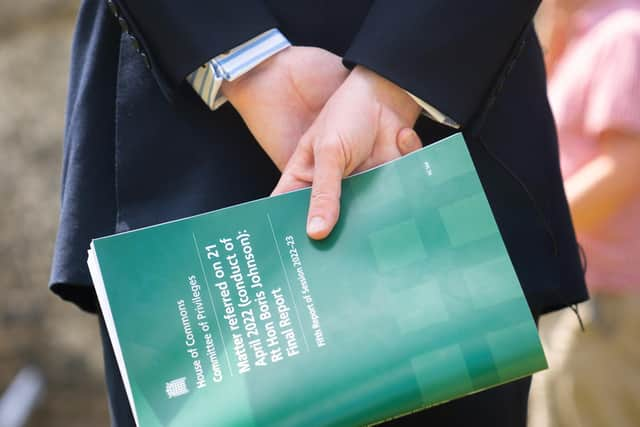Boris Johnson: ex-Prime Minister accused of fresh rule breach in failing to declare new Daily Mail job
and live on Freeview channel 276
Boris Johnson has been accused of a new breach of Parliamentary rules - by telling an appointments watchdog he’d been given a job as a columnist at the Daily Mail just half an hour before it was announced publicly.
The ministerial code requires anyone who leaves government to ask an independent committee for its advice if they take up any new role in the subsequent two years. On Thursday (15 June) a committee of MPs found Johnson lied to the Commons about the Partygate scandal.
Advertisement
Hide AdAdvertisement
Hide AdWhat is Boris Johnson’s new job?
Today’s Daily Mail trailed the arrival of an “erudite” new columnist who would be “required reading in Westminster”. The newspaper, a long-time supporter of Johnson, confirmed just after 1pm it was the ex-PM - and said he’d write a weekly opinion piece on Saturdays.
In a video accompanying the announcement, the former Tory leader joked he would only cover politics when “I absolutely have to” - and in his first column released online on Friday night, he wrote about a weight loss drug.
Johnson has frequently worked as a journalist in the past. He was the editor of the right-wing political magazine The Spectator for a time, and before he led the Conservatives, received £275,000 to write for the Daily Telegraph. His earnings from the Daily Mail column are likely to be higher.
What’s the problem?
The Advisory Committee on Business Appointments (Acoba) is supposed to be consulted when any former minister takes up a new role like this, to avoid conflicts of interest and mitigate any risk they could exploit privileged access to government contracts.
Advertisement
Hide AdAdvertisement
Hide AdAcoba was not consulted on this move far enough in advance. In a statement, it said: “The ministerial code states that ministers must ensure that no new appointments are announced, or taken up, before the committee has been able to provide its advice”.


“An application received 30 mins before an appointment is announced is a clear breach. We have written to Mr Johnson for an explanation and will publish correspondence in due course, in line with our policy of transparency”.
A spokesman for Johnson said: “Boris Johnson is in touch with Acoba and the normal process is being followed”.
What can Acoba do about it?
Acoba relies on the voluntary co-operation of former ministers when doing its work, so can’t impose any sanctions when they don’t follow its rules. MPs have previously described it as a “toothless” committee.
Advertisement
Hide AdAdvertisement
Hide AdWhat about the Partygate report?
Yesterday, Johnson was found by the Commons Privileges Committee to have deliberately misled MPs with his denials about Covid lockdown-breaking gatherings at Downing Street. The committee recommended he should be denied the Parliamentary pass that former MPs are granted.
Mr Johnson dismissed the report as “deranged” - and some of his allies including Sir Jake Berry and Mark Jenkinson have said they’ll vote against it when it’s debated in the Commons on Monday (19 June).
Rishi Sunak has given Conservatives a free vote - meaning his backbenchers won’t be ordered to support or reject the report’s findings. But today it emerged Johnson had privately urged his supporters not to oppose it - arguing the sanctions he’d face had no practical effect anyway.
That means the report could just be “nodded through”, avoiding a vote altogether. That would save Sunak from a difficult political choice:
• Backing the report and further irritating Johnson
• Voting against it and undermining his vow to restore integrity to politics
• Abstaining and running the risk of opposition parties calling him weak
Comment Guidelines
National World encourages reader discussion on our stories. User feedback, insights and back-and-forth exchanges add a rich layer of context to reporting. Please review our Community Guidelines before commenting.
